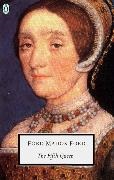Read more
Zusatztext “Ford’s last Fifth Queen novel is amazing. The whole cycle is a noble conception.” — Joseph Conrad “The best historical romance of this century.” — The Times Literary Supplement (London) “ The Fifth Queen is a magnificent bravura piece.” —Graham Greene Informationen zum Autor Ford Madox Ford (1873-1939) began his career writing fairy tales before collaborating with Joseph Conrad on several novels. After publishing successful solo works! he established the Transatlantic Review and divided his time between France and America. A. S. Byatt! novelist! short-story writer! and critic! is the author of many books! including Possession ! winner of the Man Booker Prize. Klappentext Ford Madox Ford's novel about the doomed Katharine Howard! fifth queen of Henry VIII! is a neglected masterpiece. Kat Howard-intelligent! beautiful! naively outspoken! and passionately idealistic-catches the eye of Henry VIII and improbably becomes his fifth wife. A teenager who has grown up far from court! she is wholly unused to the corruption and intrigue that now surround her. It is a time of great upheaval! as unscrupulous courtiers maneuver for power while religious fanatics-both Protestant and Catholic-fight bitterly for their competing beliefs. Soon Katharine is drawn into a perilous showdown with Thomas Cromwell! the much-feared Lord Privy Seal! as her growing influence over the King begins to threaten too many powerful interests. Originally published in three parts (The Fifth Queen! Privy Seal! and The Fifth Queen Crowned)! Ford's novel serves up both a breathtakingly visual evocation of the Tudor world and a timeless portrayal of the insidious operations of power and fear in any era. 9780307744913|excerpt Ford / THE FIFTH QUEEN part one The Coming i Magister Nicholas Udal, the Lady Mary’s pedagogue, was very hungry and very cold. He stood undecided in the mud of a lane in the Austin Friars. The quickset hedges on either side were only waist high and did not shelter him. The little houses all round him of white daub with grey corner beams had been part of the old friars’ stables and offices. All that neighbourhood was a maze of dwellings and gardens, with the hedges dry, the orchard trees bare with frost, the arbours wintry and deserted. This congregation of small cottages was like a patch of common that squatters had taken; the great house of the Lord Privy Seal, who had pulled down the monastery to make room for it, was a central mass. Its gilded vanes were in the shape of men at arms, and tore the ragged clouds with the banners on their lances. Nicholas Udal looked at the roof and cursed the porter of it. ‘He could have given me a cup of hypocras,’ he said, and muttered, as a man to whom Latin is more familiar than the vulgar tongue, a hexameter about ‘pocula plena.’ He had reached London before nine in one of the King’s barges that came from Greenwich to take musicians back that night at four. He had breakfasted with the Lady Mary’s women at six off warm small beer and fresh meat, but it was eleven already, and he had spent all his money upon good letters. He muttered: ‘Pauper sum, pateor, fateor, quod Di dant fero,’ but it did not warm him. The magister had been put in the Lady Mary’s household by the Lord Privy Seal, and he had a piece of news as to the Lady’s means of treasonable correspondence with the Emperor her uncle. He had imagined that the news—which would hurt no one because it was imaginary—might be worth some crowns to him. But the Lord Privy Seal and all his secretaries had gone to Greenwich before it was light, and there was nothing there for the magister. ‘You might have known a...

